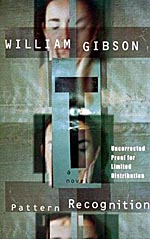
![]() Tar Daddoo
Tar Daddoo
2/6/2013
![]()
I bought this book because I knew William Gibson writes Science Fiction. I tried to start it a couple of times, but found the writing style difficult. In both cases, I was not willing to devote the attention required and put the book aside.
While browsing through Worlds Without End, I saw that it had "made the lists." I resolved to "knuckle down" and read the darn thing, since it promised to be a good SF read.
It took some doing, but I did make it past those first few pages. It is tough going because the language is full of jargon, including the primary character's personal jargon. In addition, there is an almost obsessive interest in describing how things appear and who made what. For someone who barely knows what Gucci and Armani are, it was a bit off-putting. It is only with time and perseverance that you realize that this almost repugnant (to me) focus on branding is actually important to the story and not merely an unpleasant affectation of the author.
I did "get into" the story, however, watching constantly for the Science Fiction premise or trick. The trick is that Pattern Recognition is not Science Fiction. It is written in a style that may be more familiar to SF fans than the general reading public, but it is not Science Fiction. There is no new scientific belief that you must accept or an old one that you must suspend. The technology described is state-of-the-art at best.
Upon completing the novel, I looked over the blurbs on the cover to see if the novel had been misrepresented. They do not describe it as Science Fiction. A few of the reviews describe it as visionary or an extrapolation, but this is not overblown. In truth, I deceived myself by assuming "once a Science Fiction author, always a Science Fiction author." Of course, this deception was assisted by the BSFA, Clarke, and Locus nominations dutifully noted at Worlds Without End.
As for the story, it is actually pretty good, if you can get past the writing style. It is a mystery/adventure about a young woman who is a denizen of modern advertising culture and the world-wide-web. The ease with which she uses various technologies (cellphone, email, the web) is familiar to anyone who is young. Also, the meaningfulness of the relationships formed with people you have never actually met is nicely portrayed. Finally, the portrayal of the global situation as seen in London, Tokyo, and Moscow would be familiar to Thomas Friedman.
While not Science Fiction, Gibson is providing a glimpse into a modern life that exists at the leading edge of societal changes. In Pattern Recognition we are offered an unfamiliar lifestyle that mayl become increasingly familiar as the future unfolds.
Tar Daddoo